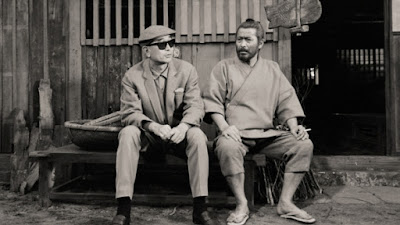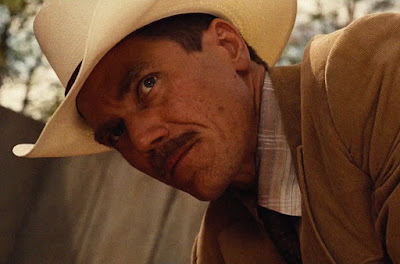Stealing (or maybe homaging) from all sorts of earlier efforts in the horror genre -- most noticeably in the lead creature's special effects via Vincenzo Natali's Splice -- the new monster/horror/ Satanist/boys-behaving-badly movie, SiREN (and, yes, that lower case "i" is intentional) turns out to be a very nice example of what can be done in the fantasy genre when you couple a low budget to some free-wheeling and creative minds. We may have seen all these various pieces previously, but the manner in which screenwriter David Bruckner and director Gregg Bishop have assembled them works like gangbusters.
If that were all, it would be plenty, but the movie offers some other nice treats (well, treats for fans of horror films, at least): subsidiary characters imagined with more than the usual, run-of-the-mill motives and visuals. First there is a fellow named Mr. Nyx, played by Justin Welborn, below, who seems to best understand what is going on here and also to be able to control it. Then there is Nyx's assistant, Ash, played with sly relish by Brittany S. Hall, a looker in a blue wig. (What we get when that wig is removed proves one of the more creative special effects.)
The bachelor party bros are also well cast and characterized, with each registering swiftly and strongly in his role. (That's Michael Aaron Milligan, below, as our hero's extremely stupid-but-caring brother.)
SiREN's special effects, in fact, are surprisingly good, given the film's relatively low budget. These are not offered non-stop -- as in so many of our current Marvel (and other) blockbuster schlock -- but are dished out quite selectively. They are also well-chosen, often surprising, and done with imagination and skill.
In the title role is an actress -- Hannah Fierman (above and below) -- whom I first saw in the segment of the horror anthology, V/H/S, from which the current film has been expanded. That short segment was impressive, all right, and the full-length movie that has resulted from it is, too. (This is not a case, as often happens, of an expansion outstaying its welcome.) Ms Fierman is as impressive here as she was in short form: weird and weirdly beautiful, she'll sweep you off your feet, just as she does, quite literally, our hero.
For a film that takes you places you've already been, SiREN manages this with unusual flair and even some surprise. Its fast pace seldom lessens, right up to the climax that, while it paves the way for a sequel, offers a perfectly fine and fixating finale all its own.
From Chiller Films, the movie opens in New York (at the Cinema Village) and Los Angeles (and the Arena Cinelounge) this Friday, December 2. For anyone not located in these two cultural capitals, SiREN will hit VOD, DVD and Digital HD this coming Tuesday, December 6th.


























































